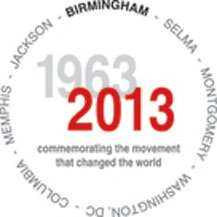King: A Filmed Record Captures MLK’s Journey

50 Years After March on Washington, 1970 Documentary “King: A Filmed Record” Captures MLK’s Journey
 As part of today’s national commemoration of the 50th anniversary of the March on Washington, the rarely seen Oscar-nominated documentary about Dr. Martin Luther King Jr. and the civil rights movement, “King: A Filmed Record…Montgomery to Memphis,” is being screened in theaters nationwide. Largely made from original newsreel footage, the film was played at a “one time only” event on one night in 1970 at 650 theaters, but has since gone largely unseen. We air an excerpt of the film in which King delivers his famous “I Have a Dream” speech 50 years ago on August 28, 1963. And we’re joined by the film’s associate producer, Richard Kaplan. Click here to watch Part 2 of this interview and see video clips of King organizing and speaking in Montgomery and Birmingham.
As part of today’s national commemoration of the 50th anniversary of the March on Washington, the rarely seen Oscar-nominated documentary about Dr. Martin Luther King Jr. and the civil rights movement, “King: A Filmed Record…Montgomery to Memphis,” is being screened in theaters nationwide. Largely made from original newsreel footage, the film was played at a “one time only” event on one night in 1970 at 650 theaters, but has since gone largely unseen. We air an excerpt of the film in which King delivers his famous “I Have a Dream” speech 50 years ago on August 28, 1963. And we’re joined by the film’s associate producer, Richard Kaplan. Click here to watch Part 2 of this interview and see video clips of King organizing and speaking in Montgomery and Birmingham.
TRANSCRIPT
This is a rush transcript. Copy may not be in its final form.
NERMEEN SHAIKH: We end today’s show with an excerpt from a remarkable and rarely seen Oscar-nominated documentary about Dr. Martin Luther King Jr. and the civil rights movement. It’s called King: A Filmed Record…Montgomery to Memphis. The film was originally shown in 1970 on one night in 650 theaters. Since then it has gone largely unseen, until today, when a print of the film restored by the Library of Congress will be screened in theaters nationwide to commemorate the 50th anniversary of the March on Washington for Jobs and Freedom, where Dr. King gave his now-famous “I Have a Dream” speech 50 years ago today on August 28th, 1963.
AMY GOODMAN: Today, on this 50th anniversary of the March on Washington for Jobs and Freedom, we bring you a large excerpt of the speech that Dr. King gave on the Mall standing in front of the Lincoln Memorial. It is introduced by A. Philip Randolph, who was the major organizer of the march. But before that, we turn to Bayard Rustin. He was A. Philip Randolph’s right-hand man, one of the greatest organizers of the 20th century, who wasn’t on the program, but this is an excerpt of him reading the demands of the march.
BAYARD RUSTIN: We demand that segregation be ended in every school district in the year 1963! We demand that we have effective civil rights legislation, no compromise, no filibuster, and that it include public accommodations, decent housing, integrated education, FEPC and the right to vote. What do you say? We demand the withholding of federal funds from all programs in which discrimination exists. What do you say?
A. PHILIP RANDOLPH: At this time, I have the honor to present to you the moral leader of our nation, a great, dedicated man, a philosopher of a nonviolent system of behavior in seeking to bring about social change, for the advancement of justice and freedom and human dignity. I have the pleasure to present to you Dr. Martin Luther King Jr.
REV. DR. MARTIN LUTHER KING JR.: I am happy to join with you today in what will go down in history as the greatest demonstration for freedom in the history of our nation.
Five score years ago, a great American, in whose symbolic shadow we stand today, signed the Emancipation Proclamation. This momentous decree came as a great beacon light of hope to millions of Negro slaves who had been seared in the flames of withering injustice. It came as a joyous daybreak to end the long night of their captivity.
But 100 years later, the Negro still is not free. One hundred years later, the life of the Negro is still sadly crippled by the manacles of segregation and the chains of discrimination. One hundred years later, the Negro lives on a lonely island of poverty in the midst of a vast ocean of material prosperity. One hundred years later, the Negro is still languished in the corners of American society and finds himself an exile in his own land.
We have also come to his hallowed spot to remind America of the fierce urgency of now. Now is the time to rise from the dark and desolate valley of segregation to the sunlit path of racial justice. Now is the time to lift our nation from the quicksands of racial injustice to the solid rock of brotherhood. Now is the time to make justice a reality for all of God’s children.
http://www.democracynow.org/2013/8/28/50_years_after_march_on_washington

